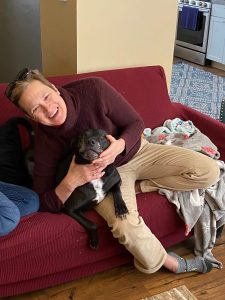‘Death in Mud Lick’: Discussion on drug use
September 23, 2021
Delores Robinson, an English Instructor, and Jayna Leipart Guttilla, an IVCC Librarian, facilitated the first One Book, One College discussion on Sept. 8 of Eric Eyre’s Death in Mud Lick.
Twenty participants joined the Zoom meeting to speak on specific passages and quotes from the book as well as relate certain situations to the Illinois Valley area and our world.
The guidelines for the discussion included the following: be kind, participate in active listening, show respect for other perspectives, and hate speech will not be tolerated.
During one of the prompts, Robinson mentioned the impact of the language from specific lines in the book and asked those participating what type of emotions they sensed or felt from the text. Many brought up the feelings of anger, grief, betrayal, and despair.
A participant emphasized the point that society pushes to put blame on people who deal drugs as if they are the only or main cause of overdoses while some responsibility may be from companies giving out those drugs. They went on to question where certain drugs are specifically coming from while another person in the Zoom meeting elaborated that from a certain perspective, a pharmacy is a drug dealer.
The idea that there are incentives to not caring for patients was also communicated due to the fact that once patients begin to feel better, then people cannot keep selling painkillers to them.
“The addiction is good for business because it means they keep buying, right?” questioned one participant.
The discussion progressed throughout the hour with comments being stated that related the book prompts to the Illinois Valley area as well as the complicity of physicians.
A member of the group highlighted the issue that society does not put enough focus on why people are choosing to use drugs and why they are becoming addicted. They continued by explaining that a drug-free world is an impossible goal as not everyone becomes addicted.
“It’s so much easier to blame an individual than the system that allows it to happen,” detailed Robinson. “We can rain down retribution on this one person who gets caught doing something that’s breaking the law, but we don’t want to think about how the laws are harming people or how this larger profit-driven world is hurting people.”
Robinson asked the participants if they believed the setting of a rural, poverty-stricken area affected their reading of the book to which Gracelyn Quesse, Student Recruitment Specialist, spoke on.
“Setting it in this area where you can see that there is already a lot of vulnerability involved… it almost felt like they were preying on disadvantaged people,” Quesse commented. “Reading through the book, you see all the things, all the signs, yet there was no action that was able to be taken.”
Leipart Guttilla acknowledged how great of a job the author did when highlighting the intersectionality and multiplicity of people’s lives and experiences. She emphasized this when speaking about the character of Debbie Preece.
“One of the really powerful hooks related to opioids is that it’s not just your physical pain that goes away, it’s also the emotional pain that goes away,” indicated a discussion group member.




